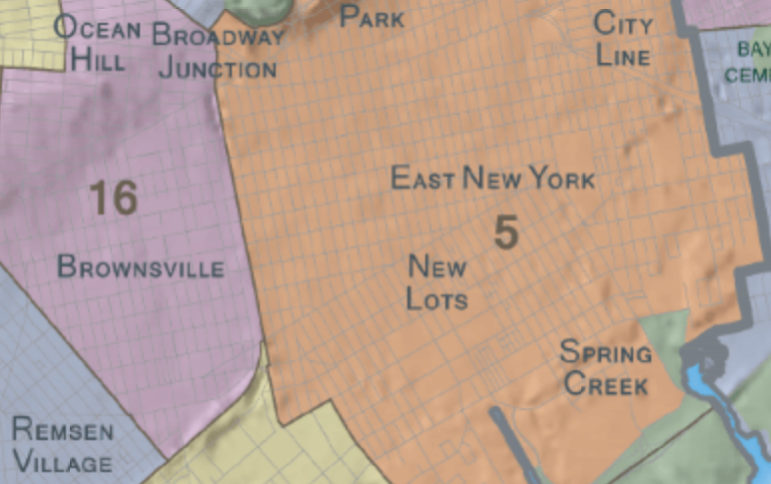
DCP
East New York is the first of many neighborhoods across New York City that is being rezoned as part of the mayor’s affordable housing plan. Rezoning means that the laws and regulations about what kind of buildings can be built, and where, are going to change our neighborhood.
Recently, the mayor’s office published a list of commitments made to the East New York community as part of the neighborhood rezoning plan approved by the City Council in April 2016. This follows the City Council’s passage of a bill that establishes a process for recording commitments for rezonings in a letter from the administration, and establishes a tracking system.
While a good first step to create transparency and accountability, this commitment tracker does not go far enough to ensure that commitments made to our community will be implemented and enforced. We are calling for a more comprehensive and coordinated approach to documenting, monitoring, overseeing and enforcing all public and private commitments that were made during the rezoning processes. This includes more frequent and substantive reporting on the progress of implementing commitments by the city, tracking change in rezoned neighborhoods over time and more clarity on how the city will carry out the commitments that it is tracking.
We believe that a centralized mayoral office is needed to coordinate, oversee and implement commitments made to rezoned neighborhoods; and community monitoring committees should be set up and supported to allow oversight and participation by community members. We know from experience that extensive community involvement is needed.
Soon after the announcement of the East New York rezoning, The Bluestone Group bought the Arlington Village housing development where 76-year-old Moises Coello has lived for 20 years, for $30 million. Counting on the mayor’s plan to rezone the building from two to 14 stories, Bluestone introduced displacement by trying to evict Coello and deny his rent-stabilized status. Tenant organizers and housing attorneys worked with Coello and his neighbors to force the owners to dismiss the case. They also convinced the city to cut Arlington Village from the rezone for now. But at some point, Bluestone or the next owner likely will try to demolish and redevelop or apply to change the zoning. The residents need and expect the city to make good on its commitment to provide affordable housing in our community.
To advocate for a fair and just rezoning process, the Coalition for Community Advancement: Progress for East New York/Cypress Hills has joined with hundreds of community and civic organizations, small businesses, houses of worship and local residents. Since its founding in 2014, the coalition has advocated tirelessly and mobilized the community to advocate for safe, accessible affordable housing, protections against tenant and homeowner displacement, living-wage jobs, needed community facilities, improved infrastructure and better services to our community.
Based on this work, we have secured some hard-fought victories for the neighborhood in the rezoning plan. We also saw some significant disappointments in the rezoning process. The final approved version of the plan did not include the commitments for deeply affordable housing or the tenant and homeowner protections that current residents need. We remain concerned that community members, including renters, homeowners, small business owners, and especially seniors and those with the lowest incomes, are at high risk of displacement in the coming years.
Now, following the rezoning, it is critically important that we have measures in place to ensure that these victories are implemented in a way that stays true to the promises made to the community. To do this, we need more than a tracker; we need a real central infrastructure for communication and coordination among city agencies and true input from community members along the way. We also need more clarity and specifics and further planning with community collaboration on some of the rezoning plan’s most ambitious and meaningful goals; e.g. “create 4,000 manufacturing jobs in the next 10 years.”
We are now working with community-based organizations across the city representing East New York, Gowanus, East Harlem, Staten Island and Jerome Avenue in the Bronx – neighborhoods slated for rezoning as part of the mayor’s Housing NY Plan to ensure that commitments made in their rezoned communities are implemented and enforced.
In this charged political moment, where New Yorkers are concerned about displacement and anxious about the future of their communities, the mayor and City Council need to build on their commitment to transparency and make sure that they are fully accountable to communities that they are rezoning.
Al Scott is a member of the East New York Coalition for Community Advancement. Alexa Kasdan is director of research and policy at the Community Development Project of the Urban Justice Center.









One thought on “CityViews: City Hall Must do More to Make Sure Rezoning Promises Become Reality”
The Coalition needs to form a permanent corporation that is dedicated to getting an ironclad agreement with specifically itemized commitments and timetables for the re-zoning plan. Another suggestion, A community benefits contract should be drafted and all the political and private stakeholders should be compelled to sign it as a commitment before the elections this year.